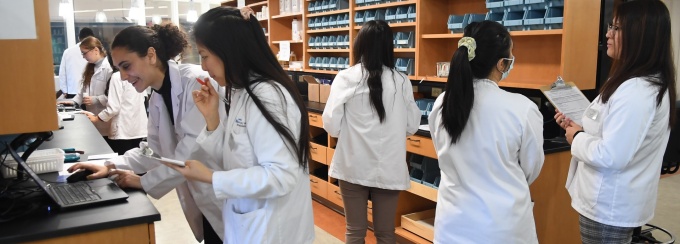Career Development for PharmD Students

On This Page:
A PharmD degree from the University at Buffalo School of Pharmacy and Pharmaceutical Sciences (UB SPPS) paves the way toward so many options for a rewarding, impactful career, and we’re here to help you through all of the steps to get there.
Consider this page your roadmap for setting yourself up for success from day one until graduation. Here you’ll find helpful tools and resources to hone in on your ideal career and select the courses, opportunities and extracurriculars to set yourself apart.
Now more than ever, PharmD graduates have plenty of career options when it comes to practicing pharmacy. Below is an overview of just some of the career paths available to you. By better understanding your career options you can begin to tailor your studies and experiential learning toward the skills and knowledge you’ll need to excel in your chosen career path.
Community pharmacists work with customers to fill their prescriptions, explain proper medication use, and provide clinical services. You might work in a pharmacy chain, community health center, compounding pharmacy or veterinarian's office, or open your own independent pharmacy.
Pharmaceutical researchers use their scientific knowledge to help develop new medications, test new substances, evaluate existing products, and create new dosage forms.
Hospital pharmacists work directly with doctors and nurses to make sure that each patient receives the correct medication, in the right dosage, at the right time.
Academic pharmacists train future pharmacists and conduct research in a university setting, or specialize in communication and educate health care professionals, consumers, and other pharmacists about pharmaceutical products, including prescription drugs.
Long-term care pharmacists provide medicine and drug treatments for long-term care facilities, such as nursing homes, assisted living facilities, group homes, and rehabilitation facilities. Home health care pharmacists specialize in treating patients in their homes or other residential facilities, such as assisted living communities.
Pharmacists can also find careers with federal agencies like Veterans Affairs, Medicaid agencies or the military; with managed care organizations like health plans or pharmacy benefit management companies; or in mail order pharmacy settings.
As you progress through your pharmacy education at UB, there are a few crucial tasks to prioritize each year to set yourself up for professional success.
P1 & P2 Career Checklist
- Consider enrolling in elective courses to enhance your knowledge and skills beyond the core curriculum.
- Preference your Introductory Pharmacy Practice Experiences (IPPE) experiential education rotations thoughtfully to align with your career goals.
- Begin to craft your resume.
- Consider dual and collaborative degrees to differentiate yourself professionally.
- Consider micro-credentials to differentiate yourself professionally.
- Learn how to get involved with research during your PharmD to boost your marketability.
Explore valuable tips, links and reference materials for opportunities to sharpen your professional identity and help you feel prepared to excel in your studies and beyond.